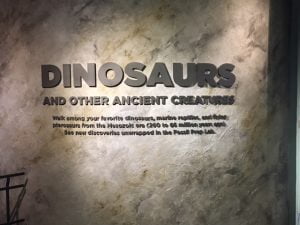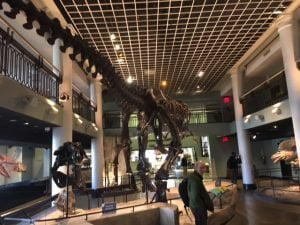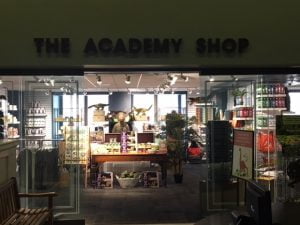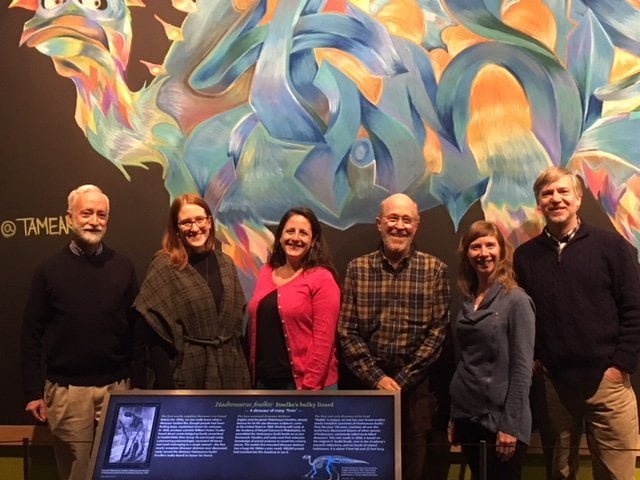Better Than Most is a regular feature of The Business of Giving, examining the best places to work among social good businesses and nonprofit organizations.
Denver: And this week, we will be headed down to Philadelphia to visit the oldest natural history museum in the western world, it is The Academy of Natural Sciences of Drexel University founded back in 1812. We’ll begin with Scott Cooper, the President and CEO of The Academy and then hear from other members of the staff.
Scott: The Academy is a truly remarkable institution. It was founded in 1812. It is the oldest natural history museum in the western world. It was initiated by seven remarkable individuals; two immigrants to this country; five, who might be considered social outsiders; all shared a profound passion for the natural world, for the America that was beginning to be discovered around them.
 Bob: I think all of us who work at The Academy are here because we love the natural world in one way or another. It’s an amazing institution about 200 scientists working in all fields of Natural History. There’s not a day that goes by when I don’t learn something about the world we’re in. It’s also a wonderful place to have colleagues who are experts in their fields, so no matter what your question is – a bird, a plant, an insect – you know where to go to, and they’re going to be able to tell you everything you could ever imagine.
Bob: I think all of us who work at The Academy are here because we love the natural world in one way or another. It’s an amazing institution about 200 scientists working in all fields of Natural History. There’s not a day that goes by when I don’t learn something about the world we’re in. It’s also a wonderful place to have colleagues who are experts in their fields, so no matter what your question is – a bird, a plant, an insect – you know where to go to, and they’re going to be able to tell you everything you could ever imagine.
Mary: If you pass somebody in the hall, they say, hey, come in here. Let me show you something really cool. Sometimes it’s an octopus in a jar. Sometimes it’s a type specimen of a dinosaur. Other times, it’s just the beautiful pressed plants, and it’s so clear the love that the people have for their collections as some of the other folks have said today. But the willingness to share it with their colleagues, not just write a paper about it and publish it or participate in a public program but their excitement to really make everyone feel like they’re part of this team and part of something bigger, I consider to the most wonderful perks of being here.
Stefanie: But every morning, I get to walk through and look at the dioramas and maybe, if it’s a really snowy day, I will stop in front of one of the tropical ones and just imagine being there or if it’s a really hot day, I might stop at the mountain, one with the rams. The way they’re drawn, if you just stand there, you feel like you’re right there. So, I love the experience of getting to be in the museum every day.
Mary Alice: So, I think this really echoes the way that our staff are a really diverse bunch from many different fields; teachers, marketers, scientists, development professionals; you wouldn’t normally find us assembled together in the same place but when we are all assembled together, we’re writing this new and bigger story, and that’s where the magic really happens.
Scott: Nevertheless, donors are supporting your mission because they believe in you. And it also misjudges sometimes the appetite that your donors have for innovation, and they can change. Donors increasingly, they don’t want to back losing horses. The idea that you only are supported by a small core of donors who absolutely only want you to do the very thing that you’ve done for the last two hundred years. At least in my institution, it’s not true.
 Ted: We’re so passionate about the things that we do for our job that we wouldn’t do anything else. Yes, I understand the need to decompress, to take time off, to not think about my case, the fossils I work on or the class that I taught last semester, or whatever the case might be. Life and work for I think a grand majority of people here really connect very deeply for those of us.
Ted: We’re so passionate about the things that we do for our job that we wouldn’t do anything else. Yes, I understand the need to decompress, to take time off, to not think about my case, the fossils I work on or the class that I taught last semester, or whatever the case might be. Life and work for I think a grand majority of people here really connect very deeply for those of us.
Stefanie: But I think part of the culture at The Academy is that people do what they’re good at, and they do what they really enjoy and I think we’re a bit lucky in our culture that we get to interpret how we manage our team and our grants and our resources in our own ways a lot.
Rick: But there’s this shared culture. When we read things in the paper about global warming or climate change or species extinction or just new bizarre facts about some octopus in the deep sea, we almost feel like, yeah I know something at The Academy that connects to that, and I’m happy I’m part of it.
Bob: I’ve been here at The Academy of Natural Sciences for over 40 years, and I still feel like a kid in a candy shop every day when I come in. The collections here are amazing. Although, the public gets to see wonderful things in the public museum, those of us who work here are lucky enough to be behind the scenes, and we get to see millions and millions of other things that may not quite make the cut to get out on the floor but they’re just as interesting, just as important, and in some ways, they’re part of that bigger puzzle that helped us try to solve problems and protect the world.
Rick: Like, one day, I woke up at 6 AM. I went to the White House, got a grant from Hillary Clinton, shook her hand, came here, and went to an evening talk by David McCullough, the author. That day is pretty special. It’s never been matched but I was blown away by the opportunity to do that. It was because of The Academy; not because of me. It was just amazing to be able to do that.
 Mary: At The Academy, we really just go above and beyond for our guests in a lot of ways that other places definitely don’t. I’ve been in the museum industry for a while in Philly, and there really is nowhere else like this as far as I’m concerned. That’s why I’m working here and not any of the other six places that I worked at over the years.
Mary: At The Academy, we really just go above and beyond for our guests in a lot of ways that other places definitely don’t. I’ve been in the museum industry for a while in Philly, and there really is nowhere else like this as far as I’m concerned. That’s why I’m working here and not any of the other six places that I worked at over the years.
Mary Alice: But I would say, around The Academy, there is just not a lot of negativity. If you are unhappy, you aren’t finding much company. In addition to all the amazing science that’s going on here, we have a commitment to sharing our science with the public, and that is something that is really important to every single person in this building, in this culture.
Ted: I think we all understand that it’s a great place to work but there’s a big picture here that we need to make sure that we stay abreast of and that is how are we going to be relevant in the future, and I think right now we’re at one of those periods of time with new leadership where we’re really asking that question and then hopefully, we’ll find the answers that will keep healthy and happy moving forward.
Scott: Transparency is absolutely fundamental. And it goes right away to the institution. One of the things for example, the little statements can be significant sometimes. One of the things that I did when I was in my last institution was I simply put my 360-degree review online for the whole of my institutions to see. Why should it be that somehow the boss is removed if he liked from the general conversations around how you perform? It was an interesting exercise, and what it demonstrated was; I am good at certain things, I am bad at certain things.
Stefanie: The day I came in, there was a giant truck blocking the exit, and I just a said a couple of things in my breath, went over and said, Hi there, I need to get this car out in 10 minutes. They said, yeah we’re just unloading the live crocodiles right now. So, we can’t move the truck for a few minutes. I just thought, I love it. I’m going to have to be late and just say to the people, they were unloading the live crocodiles. Waiting for the crocodile to cross the road. I just think we have a lot of those moments.

Denver: I wanna thank Jane Taylor for organizing my visit and to all those who participated in this segment: Scott Cooper, Rick McCourt, Bob Peck, Mary Bailey, Mary Ellis Hartsock, Ted Daeschler and Stefanie Krol. To hear this again, read the transcript or see pictures of the participants in The Academy of Natural Sciences of Drexel University, all you need to do is visit denver-frederick.com.
The Business of Giving can be heard every Sunday evening between 6:00 p.m. and 7:00 p.m. Eastern on AM 970 The Answer in New York and on iHeartRadio. You can follow us @bizofgive on Twitter, @bizofgive on Instagram and at http://www.facebook.com/BusinessOfGiving

